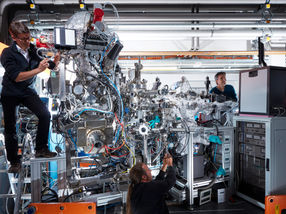Breakthrough in low loss high frequency carbon nanotube electronics
Advertisement
A collaboration between researchers at the University of Surrey's Advanced Technology Institute and the Faculty of Mechatronics of Warsaw University of Technology in Poland reports that low electrical loss at frequencies of up to 220 GHz are possible in screen printed carbon nanotube - polymer composites. Producing such low electrical loss materials potentially opens up new types of high frequency large area electronic devices.
Building upon previous EPSRC-funded research in carbon nanotube polymer composite electronics, this study, published recently in the American Institute of Physics journal Applied Physics Letters, shows that CNT composites have electrical losses of less than 0.3 dB/mm over a wide frequency range. Embedding CNTs in a polymer, in this case PMMA, allows accurate control of the nanotube content and control over the conductive phase of the composite which was screen printed into coplanar waveguides to produce structures tens of mm in length. Using a screen printing technology allows for ease of scalability for production and relaxes many of the constraints found in high end manufacturing techniques. Possible applications include new types of microwave mixers, phase shifters and antennas.
Dr David Carey from the Advanced Technology Institute of the University of Surrey said: "The success of the research is to be found by employing the unique high frequency electrical characterisation facilities at Surrey to explore electrical conduction in large area carbon nanotube based composites. Understanding what controls the conduction at the nanometer scale in these new materials can lead to the development of new high frequency carbon nanotube based electronics."
Professor Ravi Silva, Director of the Advanced Technology Institute at Surrey, said "This research shows the transformational benefits that can happen of bringing high quality specialised experimental facilities to tackle some of the key problems in modern nanotechnology and electronics. The research offers the potential for new applications of carbon nanotubes."
Most read news
Organizations
Other news from the department science

Get the chemical industry in your inbox
By submitting this form you agree that LUMITOS AG will send you the newsletter(s) selected above by email. Your data will not be passed on to third parties. Your data will be stored and processed in accordance with our data protection regulations. LUMITOS may contact you by email for the purpose of advertising or market and opinion surveys. You can revoke your consent at any time without giving reasons to LUMITOS AG, Ernst-Augustin-Str. 2, 12489 Berlin, Germany or by e-mail at revoke@lumitos.com with effect for the future. In addition, each email contains a link to unsubscribe from the corresponding newsletter.
































































